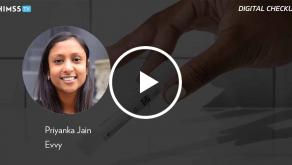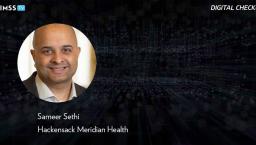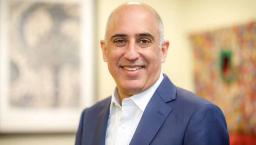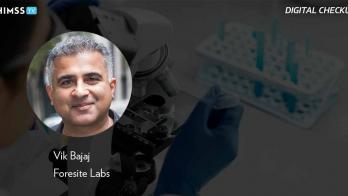Optimus Healthcare ACO boosts performance and payments with AI platform
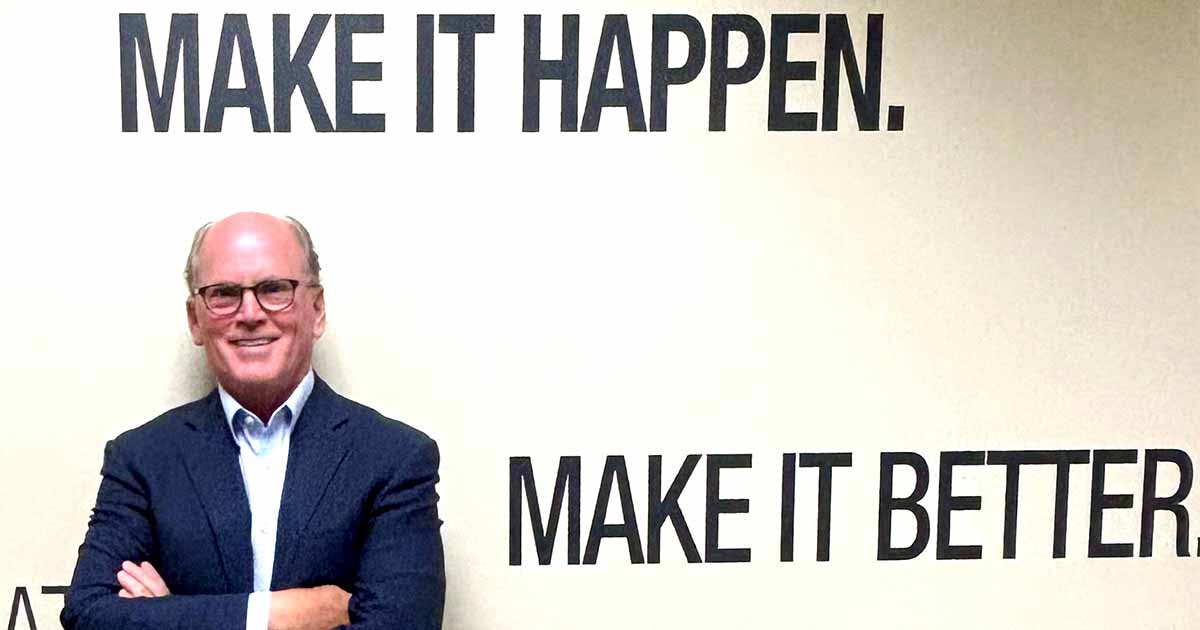
Dr. James Barr, vice president of physician value-based programs at Atlantic Health System and chief medical officer at Optimus Healthcare Partners
Photo: Optimus Healthcare Partners
Dr. James Barr, vice president of physician value-based programs at Atlantic Health System and chief medical officer at Optimus Healthcare Partners, an accountable care organization within that health system, is very firm when it comes to artificial intelligence and how it is deployed: "Your reason to use AI tools can't be just the need to say we're on the cutting edge."
THE PROBLEM
Within accountable care organizations, the challenge is designing and managing successful AI implementations that solve specific pain points and bring exponential value to physicians and the health status of populations, Barr said.
"Our top two priorities were unburdening the workflows of clinicians and understanding what is unique to each patient," he explained. "Our physicians and care teams were challenged by 'data noise' and poorly organized insights that failed to integrate in existing workflows. We also needed a way to integrate a critical source for insights – the patient.
"In addition to standard data aggregations from EHRs, payer claims, prescription files, lab sources and other inputs, we needed an AI system to continually seek patient input that could empower AI algorithms with numerous date features," he continued.
"This needs to occur in a manner that strengthens the physician-patient relationship through customized narratives instead of standard un-engaging communications."
Optimus Healthcare Partners wanted AI systems that would wow the patient, understand them better, improve their compliance with care plans, and inspire them toward healthy lifestyle choices. These challenges highlighted the necessity for AI within the Atlantic Health System's accountable care organizations.
Since its inception in 2012, Optimus Healthcare Partners ACO, a part of Atlantic Alliance, the clinically integrated network, has invested in practice transformations, evidence-based protocols, care management structures and measurement/incentive processes that "care better" for patients.
"While the effort has delivered consistent gains, it came at a cost to ACO operations and physician burden, and we still have untapped potential for patient outcomes," Barr noted. "Asking clinicians to forage through EHR tabs or cross-reference chart reminders to identify gaps is cumbersome and inefficient.
"Absent a complete picture of health services utilization, EHR-level clinical data and patient-generated data features, it is difficult to pull forward the right screening prompts, care insights or patient-specific interventions," he added.
Simultaneously, payers were requesting connections to practice EHRs for the same purpose. Optimus realized it could improve the care its physicians provided by leveraging a data platform to connect the diverse set of EHRs and surfacing insights directly within the clinical workflow. It needed to bridge this gap.
PROPOSAL
The AI technologies evaluated by Atlantic Health System ACOs aimed to enhance efficiencies within clinical quality and coding workflows, support robust clinical decision-making, and improve patient access and experience.
By integrating generative AI tools, Optimus Healthcare Partners ACO sought to automate routine tasks, reducing administrative burdens and allowing healthcare providers to focus more on patient care.
"The technology platforms can longitudinally aggregate patient data from numerous sources," Barr explained. "Then apply AI algorithms to prioritize and deliver critical insights within healthcare visits or interactions. In addition, generative AI can allow back-and-forth conversations with physicians and patients through AI chatbots. This allows real-time access for decision making by physicians and self-management for patients.
"To ensure responsible and ethical use, we planned to implement stringent guidelines and continuous validation processes, focusing on maintaining accuracy, privacy and data security," he continued. "The proposal emphasized educating and guiding team members to navigate AI tools effectively."
Recognizing the challenges in deploying AI, the strategy included identifying existing pain points for clinicians and patients, assessing their adaptability, and establishing transparent quality assurance processes to build trust.
MEETING THE CHALLENGE
The Optimus ACO uses four AI system vendors to meet the challenges within population health. Optimus invested in vendor Innovaccer to connect the disparate EHRs of independent affiliated physicians, allowing critical data aggregation that improves quality of care and produces AI care insights, Barr explained.
"The platform pulls this EHR data and organizes and curates it with claims, pharmacy, lab and other data sources to identify gaps in care," he said. "When the EHR patient chart is opened by a clinician, the InNote system prompts the clinician to review and close any open quality gaps and evaluate the assigned HCC coding opportunities.
"If questions arise, with one click, the clinician can open Patient360 to see a summary of recent or upcoming visits, labs, specialist-ordered testing and/or procedures, and social determinants of health indicators, which reduces the burden of follow-up and saves them time," he continued.
"Initial impact analysis reveals a 10% improvement in quality gap closure, a key measure of ACO network performance, and a 16% improvement in coding and documentation accuracy."
At Optimus Healthcare Partners ACO, the greatest satisfaction for physicians is time savings.
"Previously, physicians had to search in the EHR to cross-reference specialist notes and confirm if patients were up to date on preventive and chronic condition screening goals," Barr explained. "Now, with Innovaccer's AI, notes are automatically scanned for updates at the point of care, enabling physicians to focus on their patients, and this can save up to 30 minutes per day.
"To promote adoption, Optimus trains physicians one-on-one and uses performance incentives to reward practices for building new workflow habits," he added. "Peer-to-peer training, complemented by webinars and on-site coaching as necessary, also supports this effort. Finally, the vendor's population health analytics system helps generate provider scorecards and payer reports, enabling clinicians to monitor their performance."
In addition to Innovaccer, the Atlantic Health System-aligned ACOs are using AI algorithms to support evidence-based care adherence, and generative AI to produce customized narratives with patients, enhancing patient access and improving patient experience via 24/7 access to a secure AI chatbot.
"Behavioral health, pharmaco-analytics for medication management and prescriptive analytic tools are other AI systems in place," Barr noted. "We have received tremendous feedback from clinicians, practices and patients. When used correctly, AI provides one of the strongest vehicles we've seen for positive change."
RESULTS
All interventions and innovations within the ACOs involve an impact analysis. Optimus Healthcare Partners ACO has standard KPI metrics such as quality gap improvements, patient experience surveys, clinician and care team experience surveys, utilization of ER/hospital admissions/readmissions, and costs of care.
Additional metrics such as adoption, engagement and unique clinical outcomes are added specific to the use cases where the AI tool is deployed.
Using Innovaccer's platform and suite of population health management systems, Optimus has achieved a 10% improvement in quality gap closure, a key measure of ACO network performance that will deliver $1 million in potential incentive payments, and achieved a 16% improvement in documentation accuracy, Barr reported.
"The use of a secure AI chatbot platform has buffered more than 90% of patient messages to physician practices," he said. "This delivers a significant reduction in their daily burden. Initial quality outcomes and compliance with recommended screenings also have improved through AI chatbot outreach, education and reminders to patients.
"We look forward to additional KPIs as results are evaluated," he continued. "The excitement of physicians, care teams and patients already is evident. A perfect example is a patient's conversation with their physician stating they are recommending everyone should switch doctors unless their physician has similar AI tools."
ADVICE FOR OTHERS
For healthcare provider organizations considering the adoption of AI technology, it is crucial to start with a clear understanding of the specific problems that need to be solved and ensure the AI systems are tailored to address these challenges directly, Barr advised.
"Engage all stakeholders, including clinicians, care teams and patients, early in the process to identify pain points and assess their readiness for new technologies," he said. "Transparent communication and education are key to building trust and ensuring broad acceptance across the organization.
"In addition to these steps, healthcare organizations should be proactive in the establishment and enforcement of AI governance and guidelines," he continued. "While governmental oversight will occur, we in healthcare should demonstrate our ability to fully understand the complexities of AI and regulate its use responsibly within our frameworks."
Continuous validation and monitoring should be integral to the implementation process to maintain high standards and adapt to emerging challenges, he added.
"Lastly, set clear metrics for success, such as improvements in workflow efficiency, patient satisfaction and cost-effectiveness, and regularly review these metrics to ensure the AI technology delivers the desired outcomes," he concluded.
Follow Bill's HIT coverage on LinkedIn: Bill Siwicki
Email him: bsiwicki@himss.org
Healthcare IT News is a HIMSS Media publication.







